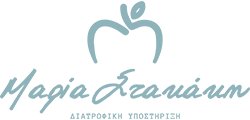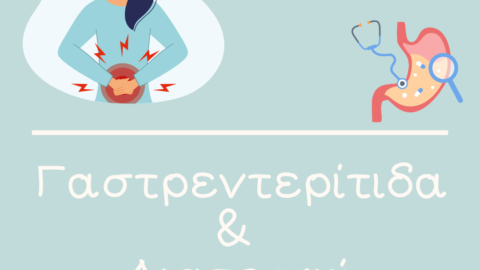Gastroenteritis is a common bowel infection caused by viruses or bacteria. It is easily transmitted from person to person and is quite common in places with children. Depending on its aetiology, symptoms may include diarrhoea, vomiting, nausea, dizziness, abdominal pain and fever. The most worrying thing about gastroenteritis is the possibility of dehydration caused by diarrhea and avoidance of it. It is also important to give advice on how to minimize the unpleasant symptoms of diarrhea.
Nutritional guidelines
The possibility of dehydration is highly likely, especially if the person avoids even water. For this reason, it is important to regularly consume small doses of thin liquids such as water, chamomile or even a liquid with small doses of electrolytes lost through diarrhoea (in cases of prolonged diarrhoea). Small doses of fluids will also reduce the likelihood of further worsening of nausea.
Όσον αφορά στο φαγητό, είναι σημαντικό να μην αποφεύγεται τελείως η κατανάλωση τροφής καθώς αυτό μπορεί να επιμηκύνει τον χρόνο ανάρρωσής της. Πιο συγκεκριμένα, θα πρέπει να προτιμώνται τρόφιμα με χαμηλό υπόλειμμα, που είναι εύπεπτα, όπως τα κράκερ, το ρύζι, οι αραιές σούπες με ρύζι ή ζυμαρικά (πχ φιδές), οι βραστές πατάτες αλλά και το κοτόπουλο ή το ψάρι ελαφρά μαγειρεμένα. Παράλληλα, συνίσταται να αποφεύγεται η κατανάλωση φρούτων ειδικά με φλούδα, πλην της μπανάνας και του μήλου.
Instead, it is important to limit dairy, fruits, vegetables, whole foods, fatty meals and condiments.
As the symptoms subside, more meat, fruit (without the skin) and lightly cooked vegetables such as carrots and pumpkin can be gradually introduced into the diet.
With the proper diet, the necessary rest and the treatment recommended by the doctor, the symptoms are expected to subside within 48-72 hours and the infection is expected to subside within a week.
The diet you should follow is low in protein, fat, calcium and fibre and is short in duration.
Foods to eat:
Pasta, rice, lean meat (e.g. chicken), light soups, bread, potato, banana or apple in small quantities, crisp bread, caffeine-free herbal drinks, sports drinks without sweeteners and caffeine
Foods to avoid:
Dairy products, caffeine, sweets, spicy foods/sauces, fried foods, acidic fruits and juices, soft drinks, legumes, oily foods, alcohol


